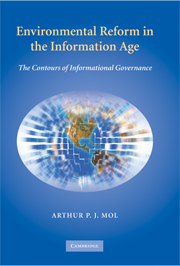Book contents
- Frontmatter
- Contents
- Tables, figures and boxes
- Preface
- Introduction: new frontiers of environmental governance
- Part I Theory
- Part II Praxis
- 5 Monitoring, surveillance and empowerment
- 6 Environmental state and information politics
- 7 Greening the networked economy
- 8 Environmental activism and advocacy
- 9 Media monopolies, digital democracy, cultural clashes
- 10 Information-poor environments: Asian tigers
- Part III Conclusion
- References
- Index
9 - Media monopolies, digital democracy, cultural clashes
Published online by Cambridge University Press: 03 November 2009
- Frontmatter
- Contents
- Tables, figures and boxes
- Preface
- Introduction: new frontiers of environmental governance
- Part I Theory
- Part II Praxis
- 5 Monitoring, surveillance and empowerment
- 6 Environmental state and information politics
- 7 Greening the networked economy
- 8 Environmental activism and advocacy
- 9 Media monopolies, digital democracy, cultural clashes
- 10 Information-poor environments: Asian tigers
- Part III Conclusion
- References
- Index
Summary
A New World Information and Communication Order?
In the 1960s and 1970s, following the decolonisation and debates on how the structure of world capitalism affected the international order, the notion of a New International Economic Order was launched, as a critique against the distortions and inequalities of the existing international economic order. Following similar lines of analysis, the distortions of and inequalities in the world's international news and information structure were criticised in the 1970s, especially for the concentration of media power within a few mighty news agencies. This resulted in a call for a New World Information and Communication Order (NWICO; cf. Gaber and Willson, 2005; McPhail, 2006: 241–66). According to the NWICO proponents, (i) the conventional, existing information order had (and still has) a highly unjust and inequitable balance in the flow and content of information between OECD countries (and the major nonstate actors related to them) and the South; (ii) there should be a right for countries to self-determination and sovereignty of domestic communication and information (in- and out-) flows and policies; and (iii) internationally, a two-way information flow should more accurately reflect the aspiration, activities and interests of developing countries, rather than that dominant northern media conglomerates create, reproduce and transmit stories on the South only as they relate to famines, wars and disasters.
- Type
- Chapter
- Information
- Environmental Reform in the Information AgeThe Contours of Informational Governance, pp. 212 - 233Publisher: Cambridge University PressPrint publication year: 2008



